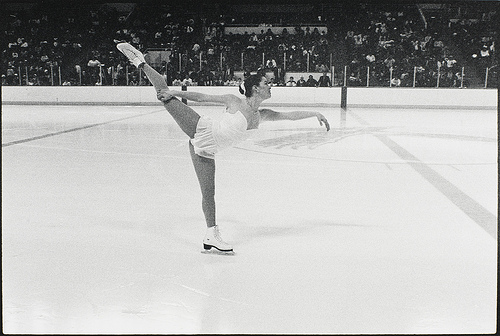This is a guest post from Laura Leonard, who will be writing here once a week or so. We’re looking at the Olympics, while there is still time — the games end this Sunday, February 23rd.

Nancy Kerrigan skating at a campus benefit at Boston College in 1993. Photo by Burns Library, Boston College via Flickr (http://bit.ly/1jVvao6)
It’s been twenty years since the Nancy Kerrigan-Tonya Harding circus dominated headlines from The National Enquirer to the New York Times, and still the infamous figure skating scandal is the first association many make with the Winter Olympics’ signature event. Hollywood, as they say, could not have written it better: two bitter rivals vying for status as “America’s Ice Princess” and the endorsement deals that came along with it in the winner-take-all world of women’s figure skating, a mysterious, sidelining attack on one by the people closest to the other at the National Championships, just six weeks before the Olympics. I was eight years old when it happened, and didn’t yet realize just how bizarre the whole thing was, but in the two decades it has become the most mythologized scandal in modern sports history.
Everyone loves a good scandal: more than 126 million Americans viewed the three-hour telecast of the 1994 ladies’ figure skating short-program competition — ranking it as the fourth-most viewed show at that time in U.S. history. It was about more than just how Nancy and Tonya would interact in warmups, or whether Nancy had overcome her injury, or how the world would react if Tonya won. Each represented more than just her four-minute free skate: Nancy the pristine and perhaps prissy ice princess who looked the part, and Tonya the rough-around-the-edges blue-collar girl who could never earn respect in an image-obsessed sport.
In the absence of definitive proof, the narratives that surrounded the incident fed into larger narratives about what it meant to be a woman in sports and in culture. It is a story about the culture of sports, about the role of class and status in judging and endorsements, about dynamics between powerful women and the public. It is a story about grudges, and everyone has a strong opinion. It is not, generally, a story about forgiveness. But Kerrigan, who rarely speaks publicly about the incident, said after a screening of Nancy & Tonya, an hour-long special that will air on Sunday before the Closing Ceremonies, “Let’s move on. You’ve got to allow people that chance to get on with their lives and try to be better and learn from mistakes.”
If anyone is well-positioned to deliver a powerful message of forgiveness, it’s Nancy Kerrigan. We many never know for sure exactly what role Tonya Harding played in her attack, but nothing can ever change the fact that it happened, and it happened to Nancy, and it defined the rest of her life. For years Harding has been asking for forgiveness from the public so ready to convict her of something the proof never could, and received little but invitations to Celebrity Boxing while her name has become synonymous with “desperate competitor willing to do anything to take out the competition.”
An even bigger question: Are we ready to forgive Tonya Harding? Does it change anything when, in The Price of Gold, we learn the difficult details of her rough childhood, about the alcoholic mother who berated her, the judges who called her homemade costumes an embarrassment, the sponsors who didn’t want her even as a national champion because she wasn’t elegant enough, the manipulative and abusive husband? Of course these things don’t change whether or not she was involved in the attack, but they remind us that she is a human being who is a product of both her choices and her circumstances. It’s not only easy to vilify public figures — it’s fun. This story remains in the forefront of our public consciousness because it’s entertaining in its cartoonish surreality. But people do things that are wrong, things that they regret, and have also had such things done to them.
The answer is yes, it’s time to forgive Tonya Harding. It doesn’t matter if she’s guilty. This does not mean we have to exonerate guilt, but there must be a point at which we demonstrate grace. We don’t have to make her a pariah. We don’t have to make her a punchline. It’s time to move on.




